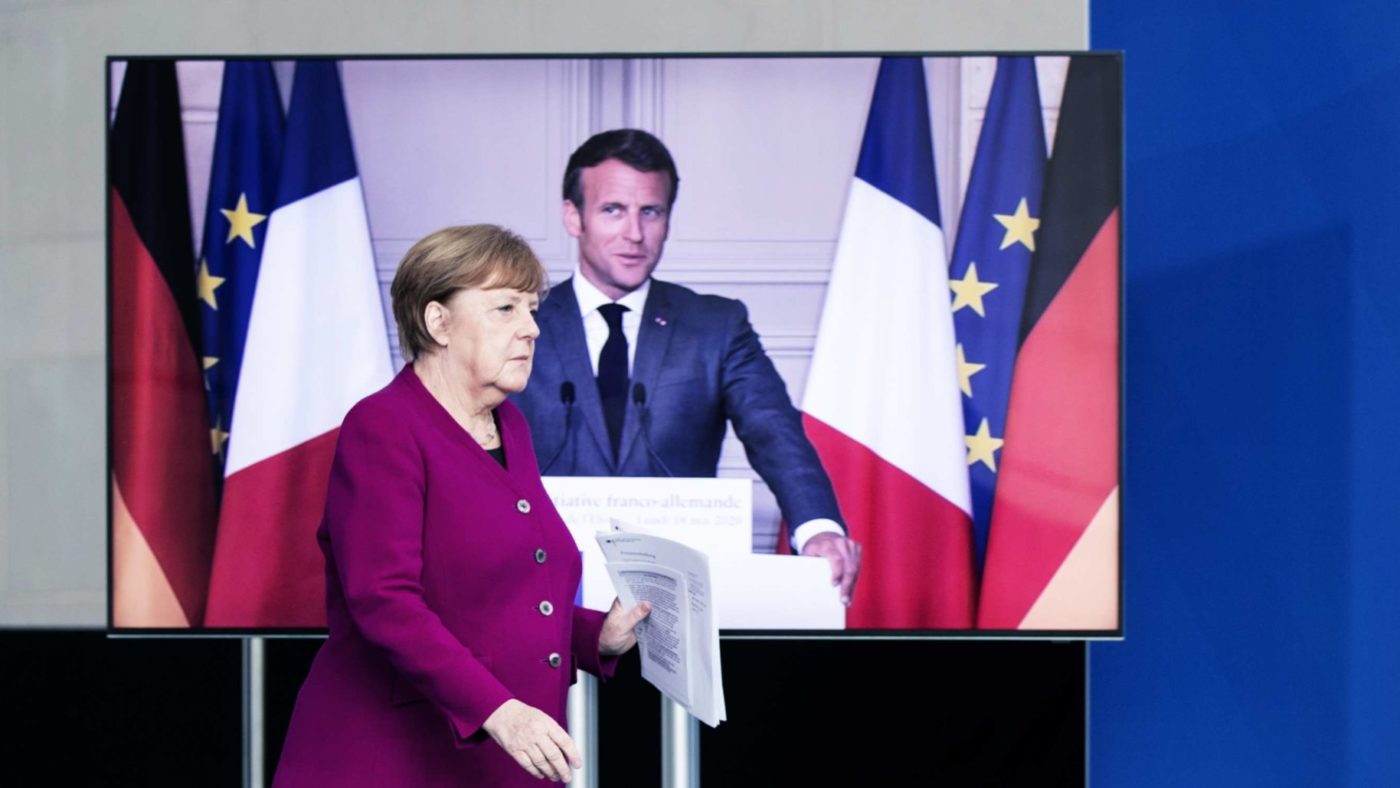At first, the European Union’s response to the Covid-19 crisis was worryingly slow and incoherent, as Brussels saw the entire continent close down, one member state after another and, thus, temporarily abandoning the EU freedoms. Since then though, ‘never let a good crisis go to waste’ seems to have become the mantra of both the European Commission a number of national leaders.
The coronavirus has become a justification for looser fiscal policies, looser monetary policy, and anything else that could mean ‘more Europe’ (which tends to actually mean more EU, to the detriment of Europe).
The clearest sign of this renewed Euro-fervour is the plan cooked up by Angela Merkel and Emmanuel Macron earlier this week to save the continent from the economic ravages of Covid-19. Seasoned Brussels observers will be shocked to learn that their proposals have very little to do with the pandemic, and everything to do with deepening the centralisation of EU power and top-down policymaking.
While Germany has traditionally been an opponent of drastic Eurozone integration, and has opposed the idea of eurobonds or similar debt collectivisation instruments, it is now advocating for precisely those policies. A €500 billion Recovery Fund designed to “stimulate” the worst-hit EU regions is now top of the agenda.
While details are still lacking on how this will be financed, the initial plan is for the European Commission to raise the money on the financial markets. It would subsequently be paid back by the member states and through increased “own resources” – i.e., new taxes levied directly by Brussels (a controversial idea pre-corona, but perhaps less so now). The French government is calculating that repayment would start after three years and would subsequently run for four decades until 2060 – even more debt for a continent already drowning in it.
The real kicker is that even though much of this money would go to the southern European states, paying it back would be a collective endeavour for the entire Union. Indeed, parts of the Recovery Fund would take the form of ‘grants’ rather than loans, meaning a country like Italy would not have to pay back the money.
That means the markets will treat the Commission’s money-lending businesses as European-wide activities through which more frugal member states would bear responsibility for those less so – this is clearly a step towards the debt collectivization that always proved a sticking point before this crisis. Germany alone will have to pay somewhere between €105bn and €135 billion towards the fund, while the Netherlands will shoulder an extra €30 billion. As Politico noted this week: “Coronavirus has claimed a new victim: German frugality.”
The Merkel-Macron plan is not just about borrowing though. The pair have also doubled down on the industrial policy that they and the Commission have been pushing for months. Their solution to Europe’s underwhelming economic performance is not the kind of pro-market liberalisation that actually powers economic growth, but a protectionist plan for hand-picked “European champions” to take on American and Chinese rivals.
To that end, state aid rules should be relaxed so that national governments can more easily prop up their companies, and relaxing competition rules to allow the formation of new mega-corporations. Of course, this kind of mercantilism is only acceptable if these companies are European. If they happen to be American, a “fair taxation of the digital economy” is suddenly needed, where tech companies – primarily from the US – are taxed repeatedly.
To ensure governments actually have enough money to finance companies moving forward – and so that any free competition between member states will be eliminated – minimum taxation should be introduced, too – something that Germany and France, both high-tax countries, have been proposing for some time. Again, all these ideas were on the table before this crisis, but have been given fresh impetus by the extraordinary moment we find ourselves in.
The good news is that none of these policy proposals are yet set in stone. There are some big legal questions, particularly on the Recovery Fund, and national parliaments would need to agree to this expansion of Brussels’ writ. Already countries like the Netherlands, Austria, Denmark, and Sweden have voiced criticism, with some arguing that the idea of grants for profligate southern states are unacceptable. Others may join them, including eastern European states who have always got a healthy slice of the EU subsidy pie, but now risk losing out to the likes of Italy and Spain. They are unlikely to meekly assent to suddenly being on the wrong side of the redistribution ledger.
But for all these obstacles, the direction of travel looks alarmingly clear. The consensus among the EU’s power brokers, as with pretty much any major world event, is that the answer is ‘more Europe’. Criticism will surely be cast as insufficient commitment to what are eminently sensible, wholly necessary recovery plans. Indeed, France’s finance minister, Bruno Le Maire, has already begun accusing those opposed to the debt splurge of being “selfish”.
The onus should really be on Marcon and Merkel to explain why yet more centralisation, huge spending and a hearty dose of protectionism are suddenly going to be the magic bullet for Europe’s economic woes. Of course, that’s not how the EU works. For Macron Merkel and their allies, this is far too good a crisis to pass up.
Click here to subscribe to our daily briefing – the best pieces from CapX and across the web.
CapX depends on the generosity of its readers. If you value what we do, please consider making a donation.


